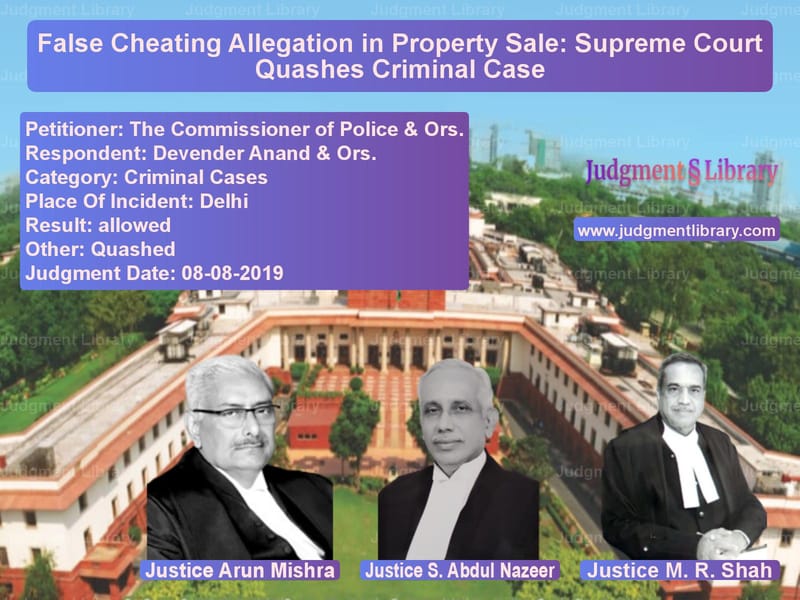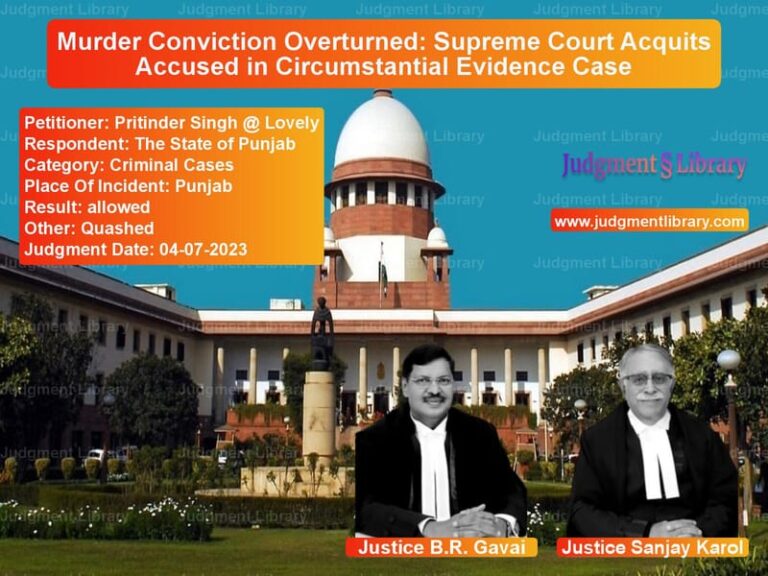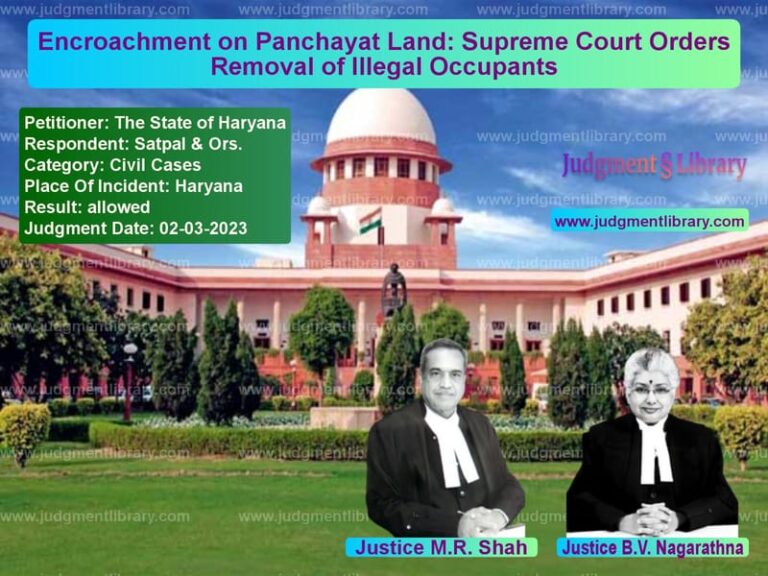False Cheating Allegation in Property Sale: Supreme Court Quashes Criminal Case
The case of The Commissioner of Police & Ors. vs. Devender Anand & Ors. involved a criminal dispute regarding an alleged act of cheating in a property transaction. The Supreme Court, in its judgment dated 8th August 2019, ruled in favor of the appellants, quashing the criminal proceedings initiated by the respondent. The case raises critical legal questions about the misuse of criminal law in civil disputes and the role of police in determining the need for an FIR.
Background of the Case
Respondent No. 1 (complainant) entered into an agreement to sell a property located at WZ-1179, Plot No. 11, Rani Bagh, Shakur Basti, Delhi with respondents No. 2 and 3 for a total consideration of Rs. 54 lakhs. The complainant paid the full consideration, and the agreement to sell, general power of attorney, and other related documents were executed.
On 31st July 2013, the complainant discovered that the property had already been mortgaged to Andhra Bank. A notice from the bank was affixed to the property, revealing that it was used as collateral. To secure possession, the complainant settled the bank’s claim by paying Rs. 16,93,059/- and additionally paid Rs. 7,81,941/- for registration charges to complete the sale deed in his favor.
Subsequently, the complainant lodged a criminal complaint at Karol Bagh Police Station against the sellers (respondents No. 2 and 3) under Section 420/34 of the Indian Penal Code, alleging that they had concealed the mortgage information and thereby committed fraud.
Dispute Over Registration of FIR
A preliminary inquiry was conducted by the Sub-Inspector at Karol Bagh Police Station. On 20th May 2015, he submitted a report stating that a prima facie offense under Section 420/34 IPC was made out and sought permission to register an FIR.
The Station House Officer (SHO) and the Assistant Commissioner of Police (ACP) concurred with the Sub-Inspector’s findings and forwarded the report. However, despite this, the FIR was not registered.
Instead, the same Sub-Inspector, Yogender Kumar, conducted a fresh inquiry on the same set of facts and came to a different conclusion. He stated that since the complainant had voluntarily paid the mortgage settlement and registered the sale deed in his name despite knowing about the mortgage, no criminal offense was made out.
This view was endorsed by senior police officials, including the Additional Deputy Commissioner of Police (DCP), who on 7th August 2015 concluded that the matter was of a civil nature and did not warrant police action.
High Court’s Order
Feeling aggrieved, the complainant approached the Delhi High Court through a writ petition, seeking directions to:
- Take action against police officers responsible for not registering the FIR.
- Quash the second report prepared by the police.
- Order an investigation into the officers who had changed their stance.
- Direct the Commissioner of Police to take corrective measures.
The Delhi High Court allowed the petition and directed the Commissioner of Police to take corrective action, treating the first inquiry as final. It also awarded costs of Rs. 25,000 against the state.
Supreme Court’s Observations
The Supreme Court disagreed with the High Court’s approach and ruled that the dispute was of a civil nature, not criminal. It made the following key observations:
1. Criminal Proceedings Cannot Be Used to Settle Civil Disputes
The Court stated:
“The criminal proceedings initiated by the complainant are nothing but an abuse of the process of law for settling a civil dispute.”
The Court noted that even after discovering the mortgage, the complainant voluntarily paid off the bank’s dues and executed the sale deed. If he truly believed he was cheated, he would not have proceeded with the transaction.
2. Validity of Police Inquiry
The Court found that the police had followed due process in conducting a thorough inquiry. It ruled:
“In view of the dispute raised, the Investigating Officer and other police officers were justified in not registering the FIR.”
It was held that the police had the authority to reconsider their findings based on the facts presented.
3. High Court’s Unjustified Interference
The Court criticized the High Court for overruling the police decision:
“The High Court ought to have closed the proceedings instead of issuing further directions.”
The Supreme Court reaffirmed that courts should not interfere in police investigations unless clear malice or illegality is shown.
Final Verdict
- The Supreme Court quashed the criminal proceedings against respondents No. 2 and 3.
- It set aside the Delhi High Court’s order directing police action.
- The Court ruled that the case was a civil matter and did not involve any criminal offense.
Implications of the Judgment
- Strengthens the principle that criminal law cannot be misused for settling civil disputes.
- Confirms that police officers have the authority to determine whether an FIR is necessary.
- Limits judicial interference in criminal investigations unless there is a clear abuse of power.
- Protects individuals from wrongful criminal charges in property transactions.
Conclusion
The Supreme Court’s ruling in this case is a significant step in preventing the misuse of criminal law for personal disputes. By quashing the proceedings, the Court reinforced that civil transactions should not be criminalized unless clear fraud is established. This judgment serves as an important precedent for similar cases where individuals attempt to use criminal complaints to exert pressure in property disputes.
Petitioner Name: The Commissioner of Police & Ors..Respondent Name: Devender Anand & Ors..Judgment By: Justice Arun Mishra, Justice S. Abdul Nazeer, Justice M. R. Shah.Place Of Incident: Delhi.Judgment Date: 08-08-2019.
Don’t miss out on the full details! Download the complete judgment in PDF format below and gain valuable insights instantly!
Download Judgment: The Commissioner of vs Devender Anand & Ors Supreme Court of India Judgment Dated 08-08-2019.pdf
Direct Downlaod Judgment: Direct downlaod this Judgment
See all petitions in Fraud and Forgery
See all petitions in Judgment by Arun Mishra
See all petitions in Judgment by S. Abdul Nazeer
See all petitions in Judgment by Mukeshkumar Rasikbhai Shah
See all petitions in allowed
See all petitions in Quashed
See all petitions in supreme court of India judgments August 2019
See all petitions in 2019 judgments
See all posts in Criminal Cases Category
See all allowed petitions in Criminal Cases Category
See all Dismissed petitions in Criminal Cases Category
See all partially allowed petitions in Criminal Cases Category







